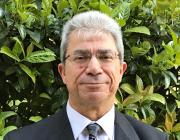|
Biographical Data
Born in Cairo, Egypt, in 1963, Paris Sphicas had his schooling in Egypt then Cyprus. He entered the Civil Engineering School in Athens, but following student occupations he left to the US to study Physics at MIT where he eventually received his PhD, working on the UA1 experiment at CERN, studying the production of multiple particle jets and searching for new resonances decaying to jets. Subsequently, he was an associate scientist at CERN, working on heavy flavours (bottom and top quark search) on UA1. In 1990, he moved back to the US, as a Wilson Fellow at Fermilab working on the CDF experiment and as an assistant professor with the Physics Department at MIT. He became Associate Professor in 1994 and Full Professor with tenure in 1997. During that period, his MIT group joined the CDF experiment, as a new collaborating institute, taking the forward calorimeter, the Data Acquisition system (DAQ), and the Level-3 Trigger under its responsibility. Moreover, the MIT team on CDF contributed to the discovery of the top quark and also led the development of new flavour-tagging techniques and carried the first measurement of a fundamental charge-parity parameter (sin2β) in a hadron collider experiment, initiating a rich program of B physics at the Tevatron in subsequent years.
In 1994, along with the first wave of US institutes that moved to the Large Hadron Collider (LHC) at CERN, he commenced his collaboration with the CMS experiment, working at first on the development of the DAQ system and the High Level Trigger. He then went on to create the Physics Reconstruction and Selection (PRS) teams of CMS. Later on, he moved to CERN, leaving the CDF experiment in 2002, in order to focus on the CMS experiment; on the same year he left MIT and became Professor of Physics at the National And Kapodistrian University of Athens (NKUA). Since then, he has served the CMS experiment as a project manager for the PRS project (2001-2004); project manager of the Computing-Physics-Trigger (CPT) project (2005-2006); Physics Coordinator of the experiment (2007-2009). Subsequently, he chaired the CMS Publication Committee (2012-2013). During the three-year period of 2014-2016 he was the Deputy Spokesperson for the experiment. He is currently engaged in searches for new physics, searches for Supersymmetry and Dark Matter, as well as in Standard Model physics processes such as studies of the Higgs boson and rare B meson decays. On the instrumentation front, he is working on the upgrade of the Level-1 Trigger system of CMS for the High-Luminosity phase of the LHC (to commence in 2029).
Prof. Sphicas has been a member of numerous international advisory and evaluation committees for funding agencies, scientific organizations and research institutes and universities. As examples, he has served on the High Energy Physics Advisory Panel (HEPAP) of the Department of Energy/National Science Foundation (USA), the Marie-Curie Advisory Group (EU), and was the Chair of the High Energy and Particle Physics Division of the European Physical Society (EPS). More recently, he was a member of the European "Physics Preparatory Group" for the New European Strategy in Particle Physics (2021++).
He has also served or is serving on the Visiting/Review/Scientific Committees of several European institutions (P2IO, LLR Ecole Polytechnique, Louvain, Marseille, AEI Spain) and as reviewer for the US, EU, B, ES, UK, NL, GE, BG, FR, CH, IT, PL. He has served/is on the international advisory committees and organizing committees of several international conferences (ICHEP, EPS HEPP, Beauty, LHCP, ICFNP, HiggsHunting...).
He is also a member of advisory committees for three European universities, a reviewer for all (Western) scientific journals in the field of High Energy Physics, and has participated in over 20 appraisal committees for university faculty and research scientists in Europe and in the USA. He has delivered more than 45 keynote, opening, and summary talks in international conventions and multiple presentations at universities and scientific colloquia.
Lastly, he was elected chair of the European Committee for Future Accelerators (ECFA) for the three-year period 2024-2026. (Prior to that he was a member of ECFA and Restricted ECFA 1998-2023).
Prizes/awards/honors:
* 2022: Elected to the European Academy of Sciences (EURASC).
* 2022: Nemitsas Prize, Cyprus.
* 2019: Elected as Fellow of the Royal Society, London.
* 2016: Papanicolaou prize, NKUA.
* 1994: Cecil and Ida Green Career Development Chair, MIT.
* 1992: Buechner Teaching Prize, Physics Department, MIT.
* 1984: Member, Phi Beta Kappa, MIT.
* 1980: First position in national examinations for admission to Greek universities (science and engineering schools).
* 1980: First prize in Mathematics, annual Cypriot high-school competition, Greek Mathematical Society.
* 1980: Honorary prize in Literature, “O. Elytis competition” for Cypriot high schools, Greece.
|

